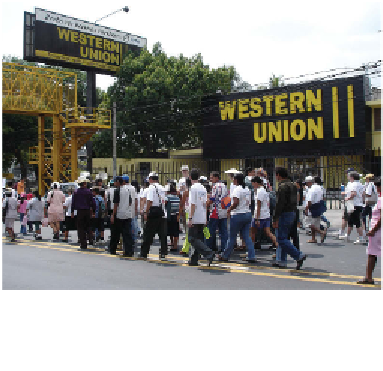Travel Reference
In-Depth Information
In 2001, two huge earthquakes killed over a thousand Salvadorans (in
a nation of about six million people). h ey destroyed or badly damaged a
quarter of the private homes in the country, leaving 1.5 million homeless. Of
course, in a big shake, it's the poor whose homes crumble—seismic safety is a
luxury only the privileged can af ord. (An earthquake of the same magnitude
hit my hometown of Seattle that same year, and no one died.) h
e best those
living in a shantytown can
do for protection is to live
in what they call “miniskirt
housing”—cinderblocks for
the lower half of the walls,
and then light corrugated
tin for the upper walls and
roof. If a miniskirt house
tumbles down, it won't kill
you. And when it's over, you
just scavenge a few two-by-
fours, reassemble the frame,
and nail your sheets of tin
back in place.
In the midst of relative al uence, Americans seem to operate with a
mindset of scarcity—focusing on what we don't have or what we might lose.
Meanwhile, Salvadorans I met, with so little, embrace life with a mindset of
abundance—thankful for the simple things they do have.
Our group dropped in on Beatriz and her daughter Veronica, who live
in a miniskirt shack on El Salvador's minimum wage. h e place was as clean
and inviting as a tin-roofed shack with a dirt l oor can be. Beatriz sat us down
and told of raising a family through a Civil War:
“h e war moved into the capital, and our little house happened to sit
between the police headquarters and the guerillas. At night I hid with my
children under the bed as bullets l ew. For ten years, the war put us in never-
ending fear. Mothers feared the forced recruitment of our sons. Finally, we
arranged a peace. But the peace accords didn't benei t us poor people.” She
explained how this “peace” was no more than an acknowledgement of the
futility of a continued struggle. To this day people are unhappy. In some
regions, there is even talk about taking up arms once more. Beatriz said, “If
war started again, I think some of us would die from the stress.”
The Western Union oi ce is a busy place in El Salva-
dor. Money wired home from immigrant laborers in
the US keeps many Central American families afl oat.















































































